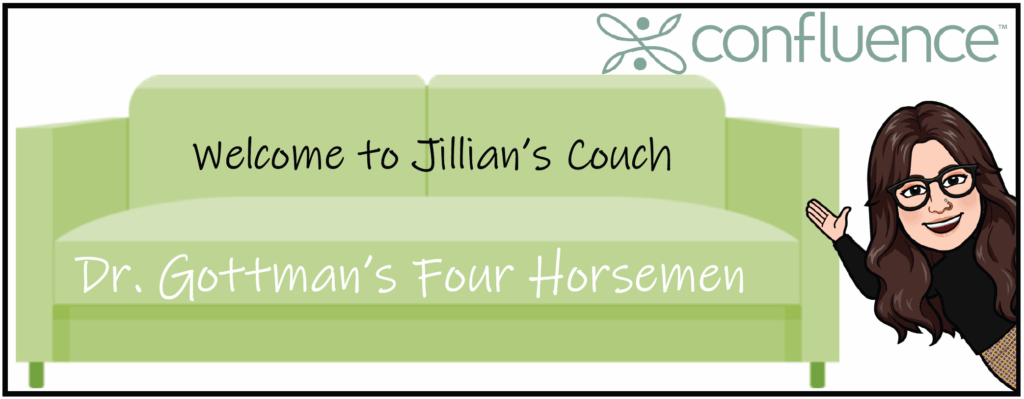
In relationships, conflict is inevitable—but how we handle it determines whether we strengthen our bond or erode it. Dr. John Gottman, a renowned psychologist, identified four toxic communication patterns that predict relationship distress and even dissolution. He called them the Four Horsemen: Criticism, Contempt, Defensiveness, and Stonewalling.
After 40 years of research with over 3,000 couples, Dr. Gottman found these behaviors were frequently present in couples who later divorced. However, don’t be discouraged if you notice one or more of these behaviors present in your relationship, it doesn’t necessarily spell disaster for you and your partner. Let’s instead look at this as a means to understand how you and your partner can grow together and learn healthy and connective communication patterns to nourish the longevity of your relationship. Understanding these behaviors and their antidotes can help couples foster healthier, more resilient connections.
In this newsletter, we’ll dive into the meaning of each of the Four Horsemen and describe the behavior you can choose instead. Stay tuned for future issues that take a deeper look at each of the Four Horsemen!
1. Criticism: Attacking the Person, Not the Problem
Criticism goes beyond expressing a concern—it targets a partner’s character. Instead of saying, “I feel frustrated when you forget to call,” criticism sounds like, “You never think about me. You’re so selfish.” Over time, this erodes trust and emotional safety.
Antidote: Use gentle start-ups and focus on specific behaviors rather than personal attacks. Express needs using “I” statements: “I feel worried when I don’t hear from you. Can we agree to check in?”
2. Contempt: The Most Dangerous Horseman
Contempt conveys superiority and disrespect through sarcasm, eye-rolling, or belittling remarks. It’s the single greatest predictor of relationship failure. Statements like, “Oh, you’re tired? Try taking care of everything like I do,” create emotional wounds that are hard to heal.
Antidote: Build appreciation and respect. Regularly express gratitude and admiration for your partner’s efforts. Even small gestures—like saying “I appreciate how hard you work”—can counteract contempt. In addition, try to shift your mindset by focusing on the positive things your partner does, rather than the negative.
3. Defensiveness: Shifting Blame
Defensiveness is a self-protection mechanism that escalates conflict. Instead of taking responsibility, a defensive response might be, “It’s not my fault! You’re always blaming me.” This prevents productive dialogue and fuels resentment.
Antidote: Practice accepting responsibility. Even if you don’t fully agree, acknowledge your partner’s feelings: “I see why that upset you. I’ll try to be more mindful next time.”
4. Stonewalling: Shutting Down
Stonewalling occurs when one partner withdraws from the conversation, either physically or emotionally. It often happens when someone feels overwhelmed, leading to silent treatment or disengagement.
Antidote: Use self-soothing techniques. If emotions run high, take a break and return to the conversation when you’re calmer. Saying, “I need a moment to collect my thoughts. Let’s revisit this in 20 minutes,” can prevent shutdowns.
A Final Thought: Strengthening Relationships Through Awareness
Recognizing the Four Horsemen is the first step toward healthier communication. By replacing destructive patterns with their antidotes, couples can build trust, deepen emotional intimacy, and navigate conflict with greater resilience.
What are your thoughts on these patterns? Have you noticed them in relationships—personal or professional? Let’s explore ways to foster more constructive dialogue.
Reference: Gottman Institute, gottman.com

Jillian Thony, MFT-A
Marriage and Family Therapist
akconfluence.com
Call/text 907. 313.4433


